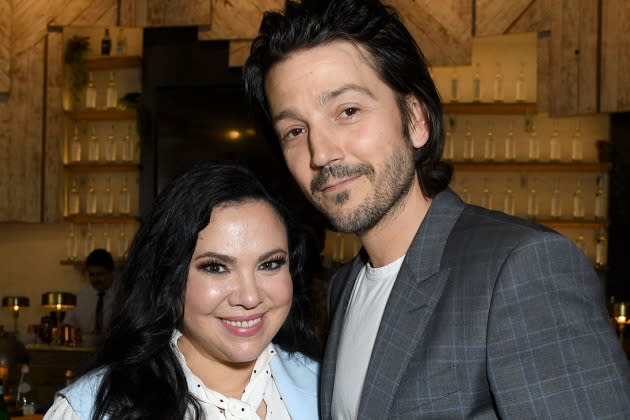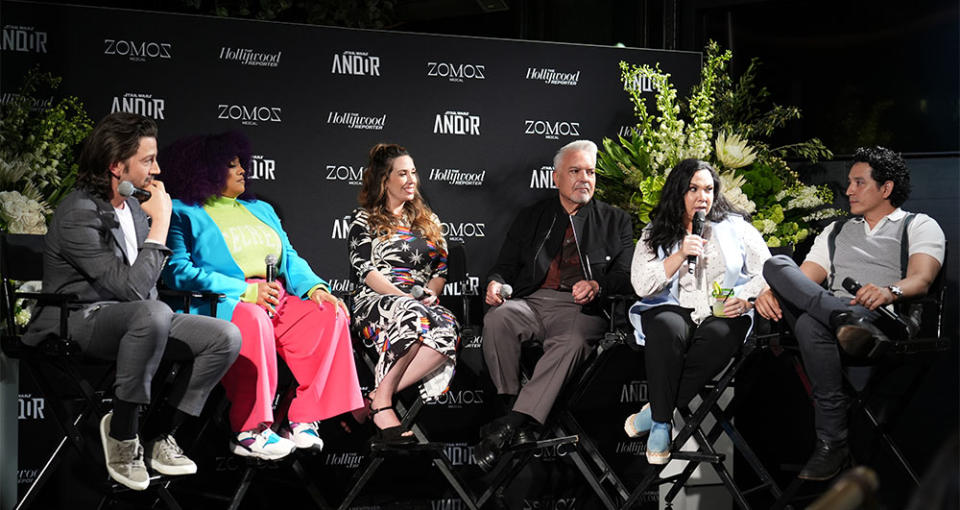Diego Luna, Gloria Calderón Kellett and More Encourage Latinx Community to Tap Into Their Own Storytelling Power
- Oops!Something went wrong.Please try again later.
- Oops!Something went wrong.Please try again later.
- Oops!Something went wrong.Please try again later.
- Oops!Something went wrong.Please try again later.

Latinx creatives gathered around sopes and mezcal at Cantina Frida in Beverly Hills on Monday afternoon for a conversation around community and representation in Hollywood.
“The fact that this room exists now is so enormous,” said writer and producer Gloria Calderón Kellett, who created the Prime Video series With Love. “We’ve got to talk about the trauma and we’ve got to talk about the wins. This room did not exist when I started where we could come together and just gather and celebrate, so give yourselves a round of applause.”
More from The Hollywood Reporter
Kellett sat on a panel during the Latinx Creatives Empowerment Brunch, sponsored by The Hollywood Reporter in partnership with Zomoz Mezcal and Lucasfilm Ltd., alongside actress X Mayo (American Auto); Tara Hernandez, co-creator of Mrs. Davis; Henry R. Muñoz III, owner of Funny or Die; and actor Gabriel Luna (The Last of Us). The conversation was moderated by Andor star Diego Luna, who was introduced with a startling statistic that underscored the need for the event.
“If he is nominated for Andor, Diego will be only the second Latino actor after Jimmy Smits to be nominated for lead actor in a drama series, and that was nearly 30 years ago for NYPD Blue,” said THR contributing editor Stacey Wilson Hunt, who organized the event.
In taking the stage, Diego reiterated the purpose of the gathering in light of that fact. “We were thinking, how do we do something around Andor that’s not about Andor because Andor is a success,” he told the crowd. “But when you hear something like this, that there’s just been one male actor nominated for best drama series from our community, things have to change.”
A key aspect of facilitating change is shifting the perspective from asking to be included to creating one’s own opportunities, said Muñoz, who told the audience, emphatically, “The moment belongs to us.”
“We need to infiltrate the places in this industry where decisions are made, and more than anything we need to quit waiting for other people to be our solution,” he said. “We need to solve this for ourselves.”

X Mayo echoed that sentiment, encouraging attendees to “lift the burden” of needing to tell complex Latino stories to appease white decisionmakers.
“I’m of the mindset that I want to continue to do as Gloria has done and climb the ladder and gain a position of power so I can then make my own ecosystem,” said the star of the upcoming comedy thriller The Blackening. “I’m not trying to change Hollywood. Hollywood has no interest in changing because if they did, white people would give up power. Latinos, we have positions, we do not have power. So if they have no interest in giving it up, fine. I’ll make my own studio; I’ll do my own shit.”
X Mayo, who identifies as Afro-Latina, also spoke about not always being seen as a Latina woman by her community because of her mixed ancestry.
“I would charge the Latino community here and in your communities and in your world at large to make room and space for us with different textures, different skin tones, different body types, who don’t speak full Spanish,” she said. “When we’re talking about ‘together,’ we have to look at the nuances of being Latino. We have to look at the whole entire umbrella, and we have to make room for us all.”
Slowly but surely, the Latino community has worked toward that collective goal, progressing past some of the divineness that once characterized the experience of Latinx creators in Hollywood, Kellett noted. “In the ‘90s, it was crabs in a barrel. It was, one of us can succeed and that’s it. But it has to be that we rise together,” she said. “If she wins, I win. If she’s getting an award, that’s me winning too because that means next year there’s going to be more of us at that place.”
The responsibility of making room extends beyond content creators all the way to the consumers, Diego noted, telling listeners, “When you buy a ticket, you’re sending a message. When you don’t buy a ticket, you’re sending a more important message. A louder one. Audiences should know the power they have. The industry is changing because of audiences.”
In an interview with THR following the event, Diego also emphasized the role of the media in ensuring that Latinx stories get told.
“I don’t think this event would be possible if there wasn’t someone telling the story,” he said. “An important player in what needs to happen is the media. There are so many people out there who get strength to go and battle against the system that has ignored them for such a long time, and it’s you guys who actually remind people of the struggle that others had to go through to get to a panel like this and talk about the future with so much hope like these people talk about it,” he added. “We are all one in the same and, therefore, change is in our hands.”
See more photos from the event.
Best of The Hollywood Reporter

